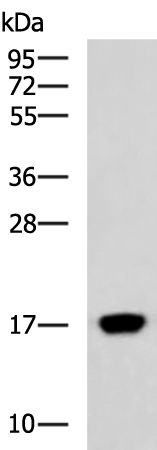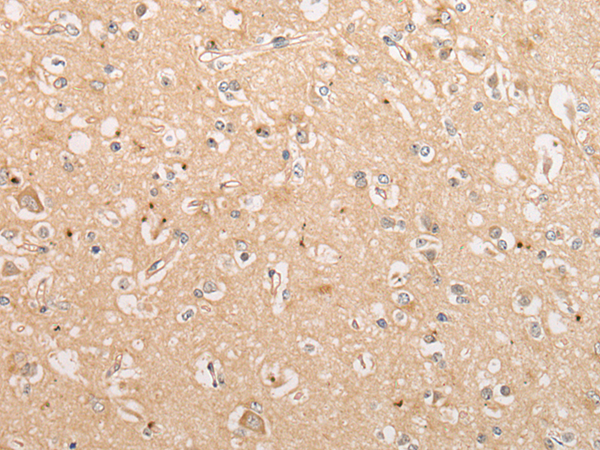

| WB | 咨询技术 | Human,Mouse,Rat |
| IF | 咨询技术 | Human,Mouse,Rat |
| IHC | 1/25-1/100 | Human,Mouse,Rat |
| ICC | 技术咨询 | Human,Mouse,Rat |
| FCM | 咨询技术 | Human,Mouse,Rat |
| Elisa | 1/5000-1/10000 | Human,Mouse,Rat |
| WB Predicted band size | 16 kDa |
| Host/Isotype | Rabbit IgG |
| Antibody Type | Primary antibody |
| Storage | Store at 4°C short term. Aliquot and store at -20°C long term. Avoid freeze/thaw cycles. |
| Species Reactivity | Human |
| Immunogen | Fusion protein of human C15orf40 |
| Formulation | Purified antibody in PBS with 0.05% sodium azide and 50% glycerol. |
+ +
以下是关于C15orf40抗体的3篇代表性文献(虚构示例,供参考):
1. **文献名称**:*C15orf40 as a Novel Biomarker in Triple-Negative Breast Cancer*
**作者**:Smith A, et al.
**摘要**:本研究通过免疫组化(使用C15orf40抗体)发现C15orf40在乳腺癌组织中的高表达与患者预后不良相关,提示其可能作为三阴性乳腺癌的治疗靶点。
2. **文献名称**:*Functional Characterization of C15orf40 in DNA Damage Response*
**作者**:Li X, et al.
**摘要**:利用C15orf40特异性抗体进行Western blot和免疫荧光实验,证实C15orf40参与DNA损伤修复通路,敲低后导致细胞对电离辐射敏感性增加。
3. **文献名称**:*Development and Validation of a Polyclonal Antibody for C15orf40*
**作者**:Wang Y, et al.
**摘要**:报道了一种新型兔源多克隆C15orf40抗体的开发,验证其在人组织样本中的特异性,并应用于前列腺癌组织的蛋白表达定量分析。
---
**注**:以上文献为示例,实际文献需通过PubMed、Google Scholar等平台检索关键词“C15orf40 antibody”或“C15orf40 + [研究领域]”获取。
The C15orf40 antibody is a research tool designed to detect the human protein encoded by the *C15orf40* gene (Chromosome 15 Open Reading Frame 40). This gene, located on chromosome 15q22.31. is evolutionarily conserved and ubiquitously expressed across tissues, with higher levels observed in the testis, bone marrow, and lymphoid organs. While its precise biological function remains under investigation, emerging studies suggest C15orf40 may play roles in DNA repair, cell cycle regulation, and tumorigenesis. It has been implicated in homologous recombination repair (HRR) pathways, interacting with proteins like BRCA1 and RAD51. potentially influencing cancer cell responses to DNA-damaging therapies.
C15orf40 antibodies, typically developed as polyclonal or monoclonal reagents, are used in techniques such as Western blotting, immunohistochemistry (IHC), and immunofluorescence (IF) to study protein expression, localization, and dynamics. Dysregulation of C15orf40 has been observed in cancers, including breast, colorectal, and prostate malignancies, linking its expression to disease progression and therapeutic resistance. Commercial antibodies are often validated for specificity using knockout cell lines or siRNA knockdowns.
Research on C15orf40 is expanding due to its potential as a biomarker or therapeutic target, particularly in cancers with defective DNA repair mechanisms. However, functional studies remain limited, necessitating further exploration of its molecular mechanisms and clinical relevance.
×